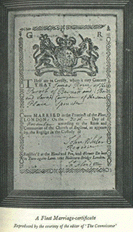|
|
|
| Clandestine Marriages
Those men and women who resorted to clandestine marriage
did so because they wanted to keep their marriage a secret. Such
ceremonies were secret because they were not performed with the rites and banns
of a public ceremony (although they were performed by a priest), they were
conducted far from family and friends, they did not necessarily take place in a
church ( common alternatives included private houses, brothels, prisons,
alehouses, and coffee shops), and they often took place outside of the typical
marriage hours of 8:00 a.m. to noon. The priests As mentioned above, the gentry would usually resort to clandestine
marriage when they thought themselves in love with a member of the lower
classes. This caused much grief and shame for their families, who of
course sought to preserve the integrity of their line, as well as preserve the
wealth of their line. A young man who married a servant girl (such as Mr.
B. of Pamela fame) was bringing no new wealth into his family, since the
servant girl had no dowry to offer. Ladies, this is not the only Specific Problems with Clandestine Marriages Some of the other problems caused by clandestine marriages included desertion and bigamy. Especially in the lower classes, men would promise women that they would marry them, and since the woman took this promise to be binding, she would sleep with him. But sadly, what often happened was that these women would become pregnant and then the men would desert them. Bigamy became rampant and difficult to control, because men would verbally promise themselves to one woman, desert her, and go on to "marry" another.11 But even if this second marriage was performed publicly in a church, it was not considered official, since the man's verbal vows to the first woman legally bound him to her as her husband.12 Another quote from Sir Dudley can show us the problems caused by clandestine marriages: "every gentleman that has been conversant in the practice of the law knows, what a number of expensive law suits are thereby occasioned about the legitimacy of children; and how difficult it often is to determine whether the parents were married or no: nay, sometimes a clandestine marriage is set up after a man's death, which was never heard of in his life time, and by an incontestable proof, which by ways and means may be obtained, his whole effects are carried away from his relations by the children of a woman whom he never acknowledged as his wife." 13 To learn more about such problems, please refer to our article "Why Quarrel?" As a final measure to inform you of the dangers of
clandestine marriage, we will now examine the stories of some of the gentlewomen
of our own class who foolishly entered into secret marriages. The
consequences of their actions will prove better than anything why the Marriage
Act of '53 was so badly needed, and why we should be grateful that it now
exists. In 1745, a Miss Elizabeth Mosely and a Mr. Arthur Collier met in
Bath, that infamous hot bed of courtship. Mr.Collier, a lawyer of no genteel
distinction, was greatly attracted to both the person and fortune of Miss
Mosley, the daughter of a baronet. Miss Mosely knew that her parents would
never approve the match (even though she was 36, in danger of becoming an old
maid), and pleaded with Arthur to delay asking her parents for her hand. (She
was waiting for the old couple to pass away.) As Mr. and Mrs. Mosely proved to
remain in good health, Elizabeth and Arthur chose to marry clandestinely by a
verbal contract (without witnesses), and by later consummating the
"marriage." When the baronet discovered his daughter's affair,
he refused to recognize This next story of clandestine marriage will serve to warn all young ladies of the dangers of succumbing to the sly thief of our virtue: DESIRE. In the first decade of our century a Mr. John Harcourt and a Miss Frances Hunt (both from families of wealth in Norfolk) were supposedly privately married by their friend Mr. Baispoole in that man's private residence while the two young people were visiting. After this ceremony, the two began sleeping together, and made no effort to hide it from other guests, even Frances's mother. When this visit ended, John accompanied Elizabeth to her mother's estate, where they continued to sleep together openly, and treated each other as man and wife. After a few months, John tired of Frances and shortly thereafter married a Miss Anne Jermy. (The Hunts did not have enough evidence to prove John's clandestine marriage to Frances. After this affair, Frances was not able to find a suitable husband. Her reputation was already tarnished. John had had his fill of illicit sex. 15 We can't help but notice that in this case as well as many others, it was the woman who was punished for her foolish actions and not the man. But this case just serves to show us that it is our responsibility as gentlewomen to make sure we never succumb to desire and suffer its disastrous consequences. A quote from Henry Gally from his "Considerations on Clandestine Marriage" will serve to summarize the foolishness of weakening under the weight of desire: "Clandestine Marriages are generally rash Marriages; made without any calm Thoughts or Deliberation; and are the Effects of some sudden Passions, and perhaps the Heat of Wine. And when these Passions and Disorders are over, and the Parties return to their serious Thoughts, they conceive a Dislike one to another; and so run into Debauchery and Adultery, and make themselves miserable all the remainder of their lives."16. Well said, Mr. Gally.
|
 performing such
ceremonies were often unreliable, and would take bribes to use unofficial
marriage forms and certificates, therefore clandestine marriages were often not
officially registered.
performing such
ceremonies were often unreliable, and would take bribes to use unofficial
marriage forms and certificates, therefore clandestine marriages were often not
officially registered. type of scandal
which was permitted to occur in the first half of our great century. The
next type of scandal to be described may shock your delicate
sensibilities. It happened from time to time, that money-grubbing persons
of the lower classes sought to lure innocent, unknowing members of the gentry
into a clandestine marriage, just so they could get their hands on their money,
and then they would desert them!
type of scandal
which was permitted to occur in the first half of our great century. The
next type of scandal to be described may shock your delicate
sensibilities. It happened from time to time, that money-grubbing persons
of the lower classes sought to lure innocent, unknowing members of the gentry
into a clandestine marriage, just so they could get their hands on their money,
and then they would desert them!